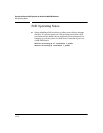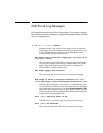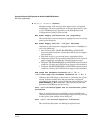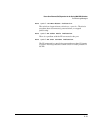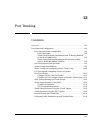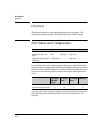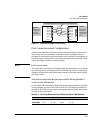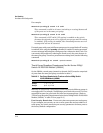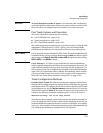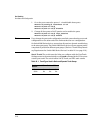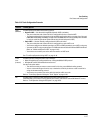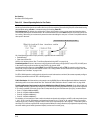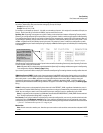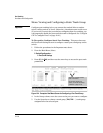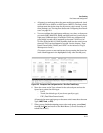
Port Trunking
Port Status and Configuration
For example:
HPswitch(config)# trunk 1-8 trk1
This command is valid in all cases (switching or routing) because all
of the ports are in the same port group.
HPswitch(config)# trunk 9-14 trk2
This command is NOT valid if IP routing is enabled on the switch
(because the selected ports are in different port groups and IP routing
is enabled). If IP routing is enabled, this command generates an error
message and will not be executed.
If a trunk group with ports in different port groups is created before IP routing
is enabled, then using the ip routing command to enable IP routing generates
an error message indicating the trunk group that violates the above rule. You
can remedy this problem by reducing the trunk to only the ports that are in
the same port group. To remove ports from an existing trunk, use the following
command:
HPswitch(config)# no trunk < ports-to-remove >
Trunk Group Boundary Requirement for the Series 4100gl
Switch 10/100/1000 Module (J4908A)
On the J4908A, a trunk group (manual or dynamic LACP) must be comprised
of ports from the same port group, as shown in table
3.
Table 10-3. Port Group Boundaries for Trunks on a Series 4100gl Switch
10/100/1000 Module (J4908A):
Ports
Group 1
1 - 5, 7 - 11, 16
Group 2 6, 12 - 15, 17 - 22
Manually or dynamically configuring a trunk with ports in different groups is
not suppported. For example, configuring a port trunk with ports 10-14 is not
supported because the ports used are from two separate groups. (Refer to
“Trunk Group Boundary Requirement for the Series 4100gl Switch 10/100/1000
Module (J4908A)” in table
12-3 on page 12-8.)
Port Security Restriction. Port security does not operate on a trunk group.
If you configure port security on one or more ports that are later added to a
trunk group, the switch resets the port security parameters for those ports to
the factory-default configuration.
12-4



